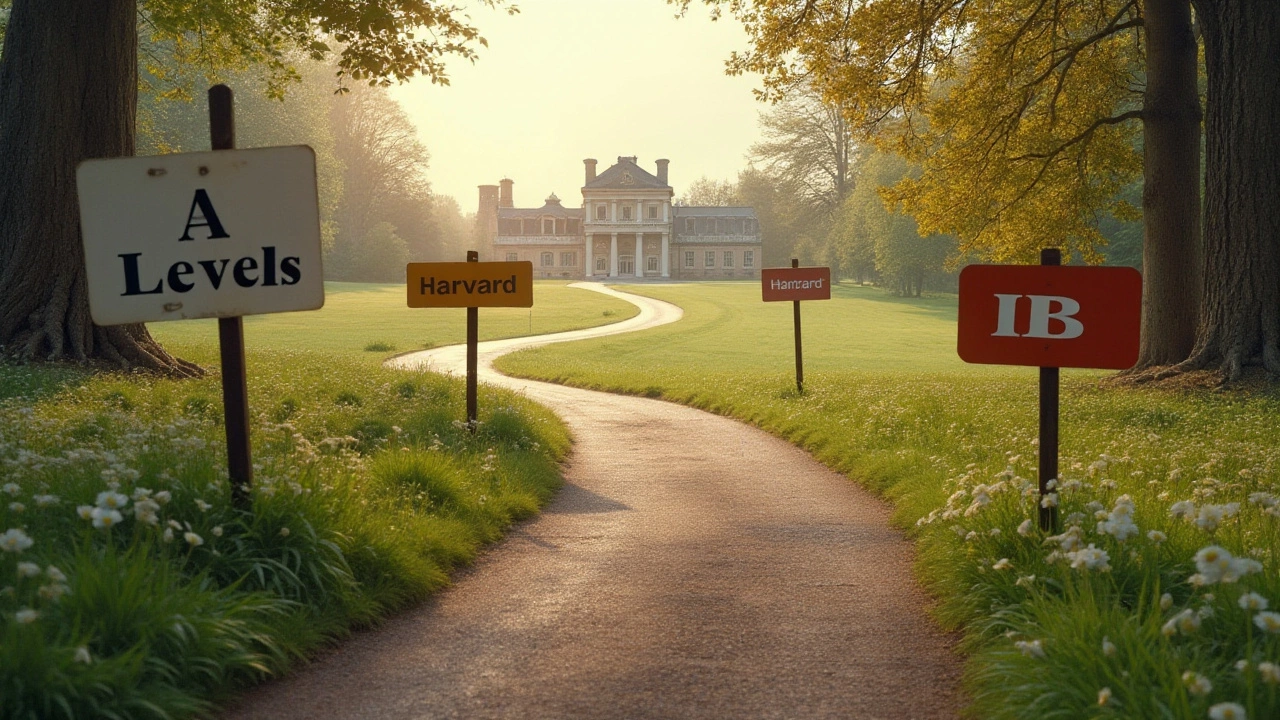When it comes to planning for a future at one of the world's most prestigious universities, the choice between International Baccalaureate (IB) and A Levels can be a pivotal one. With Harvard known for its rigorous selection process, students need to be strategic in how they present their academic prowess. Each program offers unique strengths that can shine in Harvard's eyes, but aligning these with your own strengths and goals is key.
This article is your guide through the maze of choices, offering a close look at the academic landscapes of both IB and A Levels, and how Harvard perceives them. Join us as we delve into the details, providing insights and anecdotes to help you make an informed decision that aligns with your ambitions.
- Understanding IB and A Levels
- Academic Rigor and Flexibility
- How Harvard Evaluates IB and A Levels
- Considerations for Your Personal Strengths
- Making Your Decision
Understanding IB and A Levels
When considering the educational pathways of IB and A Levels, it's important to recognize both their historical roots and modern adaptations. The International Baccalaureate (IB) was established in 1968 in Geneva, Switzerland, with the aim of providing an internationally acceptable university entrance qualification. The idea was to accommodate the growing need for globally minded education. Meanwhile, the A Levels, or Advanced Level qualifications, originated in the United Kingdom in 1951 as part of a restructuring in secondary education, evolving to offer specialist education in subjects ahead of university study.
While both programs hold high regard internationally, their structures vary significantly. The IB is known for its holistic approach, requiring students to engage in six subjects alongside three core components: the Theory of Knowledge (TOK), the Extended Essay (EE), and Creativity, Activity, Service (CAS). This structure is designed to develop critical thinking, research skills, and a sense of community involvement. In contrast, A Levels focus heavily on specialization, usually involving the intensive study of three or four subjects. This can be especially appealing to students who have defined career aspirations and wish to dive deeply into specific academic fields.
The academic rigor of both systems is notable. For instance, IB students might spend countless hours crafting a 4,000-word Extended Essay or reflecting deeply through the TOK course, a holistic examination of how we know what we claim to know. A Level students, on the other hand, face a demanding examination structure with multiple high-stakes exams determining their grades. These exams are often thorough, testing not only knowledge but application and critical thinking. A-Level students frequently find the need to supplement their studies with extensive exam practice and past paper reviews, emphasizing the exam-oriented nature of the qualification.
Despite their differences, both the IB and A Levels develop valuable skills that prestigious universities like Harvard appreciate. Critical thinking, independent research, and deep subject knowledge are traits groomed by both courses, each in their unique way. Speaking on the value of diverse educational programs, a Harvard admissions officer once commented, "We cherish students who challenge themselves across frontiers, academically and personally. Attributes like these align with our education ethos." Such an endorsement highlights how different education systems can cater to Harvard's expectations differently.
Families often consider the teaching style and assessment types when selecting between the IB and A Levels. IB's continuous assessment system comprises internal assessments, essays, presentations, and oral examinations spread over the course’s duration. A Levels rely predominantly on final exam performances. This crucial difference can influence a student's choice based on their personal strengths. Students who thrive under constant engagement might lean toward the IB, while those who excel in high-pressure exam scenarios might prefer A Levels.
Understanding your aspirations and strengths is vital when choosing between the IB and A Levels. Both pathways offer challenges but also incredible opportunities. Their global recognition and respect affirm their reputations as robust educational programs, preparing students not only for universities like Harvard but for lifelong learning and citizenship.
Academic Rigor and Flexibility
Both the International Baccalaureate (IB) and A Levels are renowned for their academic rigor, yet they offer distinct educational experiences. Understanding these differences is crucial for students who aim to present a compelling application to Harvard. The IB program is comprehensive, making it an excellent choice for those who thrive in a multidisciplinary environment. Its curriculum consists of six subjects split into three higher-level and three standard-level courses, along with the Core elements: Theory of Knowledge (TOK), Creativity, Activity, Service (CAS), and the Extended Essay. These Core aspects encourage students to think critically and develop a global outlook, skills that align well with the values Harvard looks for in a candidate.
On the other hand, A Levels provide more specialization. Students typically select three or four subjects that they will study in-depth over two years. The advantage of this path is the depth of knowledge one gains in specific areas, which can be very appealing if you already know what field you want to concentrate on at university. This focused learning method allows students to become specialists in their chosen subjects, which can be a significant advantage when applying to degree-specific courses at institutions like Harvard. Renowned educational consultant, Simon Grange, once said,
"A Levels hone specific expertise, which can be a huge advantage in applications to courses with defined prerequisites."
Balancing Rigor and Personal Interests
Choosing between these two options often depends on a student's personal learning style and future aspirations. The IB pressures students to manage demanding workloads from multiple disciplines, fostering strong time management skills. This pressure can be seen as a double-edged sword, as it prepares students not only academically but also in practical readiness for university life. Harvard appreciates this readiness, often seeking out global thinkers who are unfazed by challenges.
A Levels offer their own form of rigor. Each subject is taught at a significant depth, preparing students superbly for higher education's demands. The autonomy offered in selecting subjects is beneficial; students can pursue areas they are genuinely passionate about, which can make learning more enjoyable and less stressful. Passion for one's subjects often translates into academic excellence, nurturing a focused application to Harvard that demonstrates both depth and dedication.
While making your choice, consider your abilities, interests, and ambitions. Are you someone who flourishes in a broad academic environment, or do you prefer focusing deeply on specific subjects? Perhaps a conversation with a school advisor or a current student from either program could provide insight. These decisions should align closely with your aspirations and your envisioned academic journey. Whichever path you take, remember that demonstrating purpose and passion is often the key to making your application truly resonate with Harvard's admissions committee.

How Harvard Evaluates IB and A Levels
Understanding how Harvard evaluates applications that include IB or A Levels can provide invaluable insight for students aiming for this prestigious institution. Both curriculums are highly respected worldwide, each offering rigorous coursework and high standards of academic achievement. At Harvard, the focus is less on which curriculum you choose and more on how well you have challenged yourself academically and how you have taken advantage of the opportunities provided to you. Admissions officers look for strong performances in both, understanding the demands each program places on students.
The International Baccalaureate program, known for its broad and holistic approach, encourages students to excel across a range of disciplines. Harvard appreciates the balance of depth and breadth in the IB curriculum, as well as its emphasis on research and independent learning. The Extended Essay, a key component of the IB, is particularly valued for showcasing a student's ability to conduct independent research, a skill crucial at university.
On the other hand, A Levels offer a chance for students to specialize early, focusing on three or four subjects. This can be particularly appealing to students who have a clear sense of their academic passion. Harvard values the detailed and in-depth knowledge that A Level subjects can provide, particularly if a student is showing high levels of achievement in subjects pertinent to their intended field of study. These specifics can also give a strong narrative to a student’s application, illustrating their academic focus and competencies.
A former admissions officer at Harvard once mentioned, "We look closely at what students do with the opportunities they have. Whether it’s IB or A Levels, it’s the student’s performance and the context of their achievements that speak volumes."
An important consideration is that Harvard does not operate a fixed formula or a points-based system for assessing IB or A Levels. Instead, they adopt a holistic approach, considering your overall academic record, recommendation letters, personal essays, and extracurricular activities. The level of dedication, resilience, and intellectual curiosity that students demonstrate in their program of choice plays a critical role. Both the IB and A Levels have produced many successful Harvard students, so the choice truly depends on the individual's strengths and aspirations.
To illustrate how performance can align with Harvard's expectations, consider this: both IB and A Level qualifications have benchmarks that align well with the undergraduate demands of Harvard. Achieving high scores, such as completing the IB diploma with 38 points or above, or securing A* grades in A Levels, can demonstrate your readiness for the academic challenges ahead. These scores reflect not just knowledge, but the ability to apply learning in dynamic contexts, a critical factor in Harvard’s assessment.
Considerations for Your Personal Strengths
When you stand at the crossroads of educational choices, deciding between IB and A Levels, it's crucial to pause and reflect on your personal strengths. Each path offers opportunities for different types of learners, and aligning your choice with what you're naturally good at can set you up for success. Are you someone who thrives in an environment of structured learning, wherein each assessment is pivotal? If so, the A Levels might appeal to your keen analytical abilities and focused subject interest. This option allows you to dive deep into three or four subjects, pushing you to excel in areas you're passionate about while maintaining a sharp academic focus.
On the other hand, if you're the kind of student who enjoys connecting dots across a spectrum of subjects, IB may be your ally. With its holistic approach, IB nudges you towards a comprehensive understanding of the world, demanding both intellectual agility and curiosity. The inclusion of Creativity, Activity, Service (CAS) not only broadens your mind but also encourages personal growth outside the traditional academic structure. Students often find themselves thinking outside the box, complementing their academic journey with real-world experiences, which can be rewarding in a place like Harvard where such qualities are highly prized.
In deciding, it might help to consider which learning style resonates with you. Are you driven by examinations and specific, concentrated study? Or do you flourish when given a wide berth to explore ideas and themes that interlink? These considerations form a vital framework for making your decision. As Albert Einstein once mused, "The measure of intelligence is the ability to change." Adapting your choice based on a clear understanding of your strengths and weaknesses can sometimes make all the difference in the demanding journey that is preparing for an elite institution.
There are statistics to consider, albeit not universally applicable, indicating that students who align their choices with personal strengths report greater satisfaction and success. A study conducted by the University of Chicago found that students who feel an intrinsic motivation to learn, often tied to personal strengths, are 12% more likely to achieve higher grade points. Nonetheless, it's essential to remember that the right decision often lies in introspection and honest self-assessment, beyond mere numbers or external pressures.
In both IB and A Levels, the challenge lies not only in mastering the content but also in demonstrating your unique strengths to admission boards like Harvard’s. Tailoring your academic journey to showcase these strengths can speak volumes about your capacity for long-term commitment and intellectual vitality, attributes that Harvard holds in high esteem. Ultimately, the best path forward is one where you see not just challenges but opportunities to shine.

Making Your Decision
Deciding between the International Baccalaureate (IB) and A Levels is not just an academic choice; it's a pathway that can significantly impact your university application, especially at selective institutions like Harvard. Each route offers a unique set of challenges and opportunities, and determining which is the better fit requires introspection and research. Consider what kind of learner you are: do you thrive in environments that encourage depth of knowledge in a few subjects, or do you prefer the broad, balanced approach that the IB offers? The A Levels, with their focus on specialization, can be ideal for students who are certain about the field they want to explore at a higher academic level.
Engaging with current students or alumni from both programs can provide invaluable insights. They can share personal experiences that might resonate with your own academic style and aspirations. Harvard's admissions officers have often indicated that they are impressed by applications that reflect a student's passion and curiosity. As such, whichever program you choose should echo your genuine interests. If science and mathematics call to you, A Levels could be the perfect canvas to showcase your expertise. Conversely, if humanities and languages capture your imagination, the international flavor and creativity of the IB might provide a broader range to express your knowledge.
To assist in making your decision, it could be useful to lay out the pros and cons visually. Consider creating a table where you juxtapose subjects, assessments, and extracurricular opportunities of each curriculum. For instance, the IB requires students to complete an extended essay and theory of knowledge course, which can demonstrate critical thinking skills. Meanwhile, A Levels might offer more options for depth in areas that you are passionate about, such as in intensive studies of a single novel or scientific exploration.
Remember: Prestigious universities like Harvard are looking for students who are not only academically gifted but also reflective thinkers. Would you prefer a program that prepares you with diverse skills, or one that allows intense focus? Harvard itself states that a successful applicant can come from either background, provided they demonstrate a spark and commitment to their chosen path. In the words of Nora Hon, an international education expert,
"Choosing the right curriculum depends not just on where you want to go, but on who you want to be when you get there."Taking the time to assess your personal goals, academic strengths, and future plans will lead you to the right choice.
Ultimately, this decision is about aligning your educational journey with your personal interests and career aspirations. It's a deeply personal choice, and while Harvard values both IB and A Levels, your authentic commitment to learning and exploration will stand out in any application. Engage deeply with the subjects that you choose, and let that passion guide you to success.






